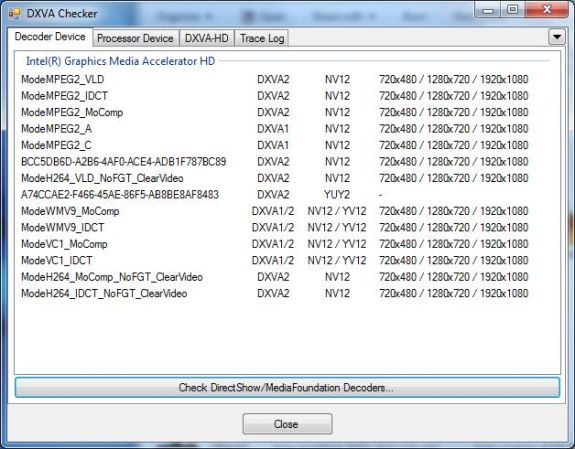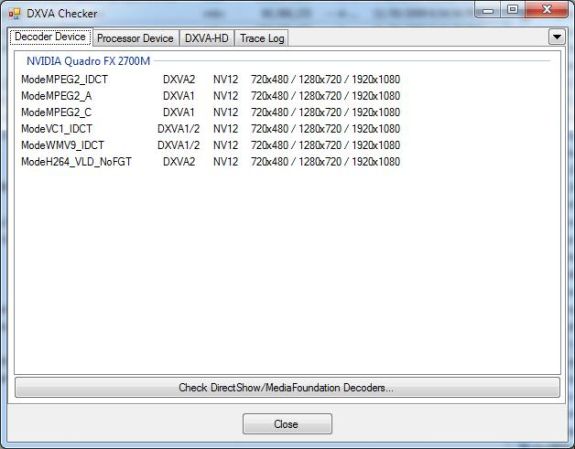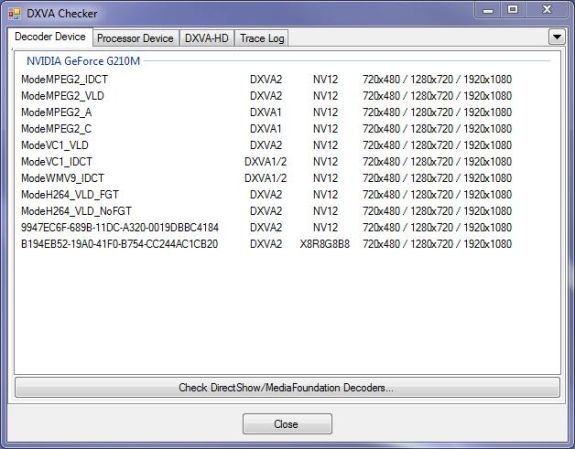HD Video Decoding on GPUs with VLC 1.1.0
by Ganesh T S on June 25, 2010 4:35 AM EST- Posted in
- Home Theater
- HTPC
Catalyst 10.6 does not provide any support for VLC's GPU acceleration methodology, but AMD seems to suggest that a update to fix this is coming soon. Knowing ATI's lethargy in fixing drivers for anything not related to gaming, we decided to ignore their GPUs for the time being.
[UPDATE 1: June 26, 2010: We heard back from AMD PR as well as the concerned VLC developer, and we are told that Catalyst 10.7 (expected by mid-July), and VLC 1.1.1 (expected in 3 - 4 days) enable acceleration on ATI GPUs also. Apparently, they have verified that the acceleration works in the labs, and are waiting on final QA. I am now willing to reconsider my earlier opinion on ATI's lethargy and hope that this sort of response is a sign of good things to come for AMD/ATI HTPC users.]
[UPDATE 2: July 2, 2010: AMD provided us with the pre-release Catalyst 10.7, and Jean-Baptiste gave us the VLC 1.1.1 build. On one of AMD's recent Radeon chipsets, GPU acceleration works better than Nvidia's. Also, it looks likely that Radeon 3xxx users will be unable to take advantage of VLC's acceleration. More details will follow once Catalyst 10.7 is officially released].
VLC developers couldn't test their acceleration methodology on the Intel IGPs at all. As end users, we decided to test it out for them.
We utilized 3 test beds for our evaluation
1. Intel IGP - Arrandale ClearVideo: Gateway NV5935u
2. Nvidia - Quadro FX2700M PureVideo VP2: Customised HP 8730w [ Core 2 Duo T9400 / 4GB RAM ]
3. Nvidia - GeForce G210M PureVideo VP4: Sony Vaio VPCCW13FX/R [ PDF ]
The DXVA capabilities of each platform are evident in the screenshots below.
All machines were tested using VLC 1.1.0 on Microsoft Windows 7, using a 37" Toshiba Regza HDTV connected via HDMI through an Onkyo TX-SR606, at 1920x1080p resolution in Extend mode (with the primary screen running at 1366x768). One set of tests was run with GPU acceleration disabled, and another with GPU acceleration enabled. CPU usage was tracked for both runs and the maximum values over the course of playback compared.
GPU acceleration has been provided by VLC for MPEG-2, H.264 and VC-1. Since MPEG-2 is easily handled by even low performance processors, we decided to cover only H.264 and VC-1 in our test suite. Eight different streams were tested, with the following characteristics
1. L4.1 H.264 1080p30 @ 8.3 Mbps (M2TS)
2. L4.1 H.264 1080p24 @ 10.2 Mbps (MKV)
3. L5.1 H.264 1080p60 @ 10 Mbps - 8 reference frames (MKV)
4. L5.1 H.264 1080p24 @ 19 Mbps - 16 reference frames (MKV)
5. VC-1 Main Profile 1080p24 @ 8 Mbps (WMV9)
6. VC-1 Advanced Profile 1080p24 @ 18 Mbps (MKV)
7. VC-1 Advanced Profile 1440 x 576 @ 6 Mbps (WMV)
8. VC-1 Advanced Profile 720p60 @ 15 Mbps (WMV)
We decided not to use any interlaced media in the test suite since VLC does the deinterlacing on the CPU using SSE2 instructions even if GPU acceleration is enabled. This ensures that deinterlaced media playback remains consistent across different cards and driver versions.
The GPU acceleration support provided by VLC on Windows has a very different architecture compared to the one used by programs such as MPC-HC and Windows Media Player. As explained by one of the developers here, VLC prefers a slower method of GPU acceleration in order to maintain the framework aspect. It decodes on the GPU but gets the decoded data back for further processing. Therefore, CPU usage would be worse off when compared with playback using MPC-HC or Windows Media Player. For this reason, the only comparisons we make further down in this piece are within VLC (acceleration on vs. acceleration off), and not with other media playback programs.













74 Comments
View All Comments
puffpio - Friday, June 25, 2010 - link
uh that's not truethere exists some dvds that are encoded interlaced..some dvds that are of old tv shows, for example
ganeshts - Friday, June 25, 2010 - link
barniebg, I agree with you!However, VLC developers are more interested in maintaining consistency across platforms and the framework, rather than improving performance and quality on a single type of system.
Currently, VLC uses CPU SSE2 instructions to implement the Yadif deinterlace filter [ http://avisynth.org.ru/yadif/yadif.html ]. I am trying to find out how it compares with GPU deinterlacing (any benchmarks?). If the performance is similar, but we just take a CPU usage hit, it might not be such a bad thing after all (since VLC wishes to cater to the lowest common denominator amongst media player users)
ganeshts - Friday, June 25, 2010 - link
Note: VLC devs recommend use of Yadif over other deinterlacing mode options which might be availablepaulpod - Friday, June 25, 2010 - link
It is a bad joke for anyone to claim hardware acceleration of video when deinterlacing is not included. But you get what you pay for, I guess.Software and CPUs can decode any video format at full quality without much effort. It is deinterlacing that requires GPU acceleration because detection of moving diagonal edges is extremely compute intensive. And as people have pointed out, most TV broadcast is 1080i mpeg. Yes, the Olympics, the World Cup (in Spanish with better announcers than ESPN), and other little things like that.
Let's hope the simple API connections necessary for them to support deinterlacing will be in a future release, at least to the point where they pass control to the graphics driver.
Rainman200 - Friday, June 25, 2010 - link
Your opening comments about MPC-HC are a bit inaccurate.1) That guide linked to is overkill, intended for very specific anime people.
2) The CCCP pack installs MPC-HC but has nothing to do with it. Codecs packs are a bad thing in general go ask anyone on Doom9 forums though MPC-HC is directshow capable unlike VLC.
To enable DXVA playback under MPC-HC you just install the player and change the output to EVR-Custom thats it no other changes are necessary nor any codec packs.
If it doesn't work then it a hardware/driver issues but not the fault of MPC-HC.
That said its good to see VLC add this support, XBMC is also working on DXVA2/VAAPI and CrystalHD support.
ganeshts - Friday, June 25, 2010 - link
I first started using MPC-HC when I was on WinXP.I remember the countless nights I spent in trying to accelerate some HD files. It refused to do DXVA till some registry entries were modified to make it ignore L4.1 restrictions. Even then, some files would work better with the Cyberlink decoder, and hence I had to make mods in MPC-HC to load that filter. All in all, it was a bit of a trying (but ultimately satisfying -- after I moved to Win7) experience.
I agree that the recent releases work much better than the ones I used to tussle with, but I still see the comments list on that anime blog being updated years after it was first posted! I would assume that this means MPC-HC offers options / makes users want options which can easily make them shoot themselves in the foot!
PS : I love MPC-HC! All my MKVs and M2TS default to that, but for everything else, I still use VLC :)
ciukacz - Friday, June 25, 2010 - link
AFAIK there is no standardized API for HD audio bitstreaming under Windows (and probably under other OS's too). developers have to add it "per device". with a development team of 5 it is wishful thinking.Nehemoth - Friday, June 25, 2010 - link
Kmplayer had hardware acceleration since a lot of time ago and as VLC you don't need to install codecs pack, even better in Windows 7 you can use the system codecs if you want to.I would like to see kmplayer against VLC.
piroroadkill - Friday, June 25, 2010 - link
Kmplayer is a rip off of Media Player Classic...http://en.wikipedia.org/wiki/K-Multimedia_Player#C...
CSMR - Friday, June 25, 2010 - link
Spotty DXVA in VLC is not news. Even if VLC gets perfect playback, including subtitles, all popular formats, and is customizable, then you just have a competitor to MPC-HC, good but not exactly a step forward for the HTPC world.MPC-HC has no problems with DXVA playback on any modern mainstream GPU (including integrated). You do not need a tutorial to do this; the link is for people who want to get all the settings right, because MPC-HC is very customizable.
The only important free media players atm for HTPC users are MPC-HC, because it is the best, and WMP, because it is popular and integrated into WMC.